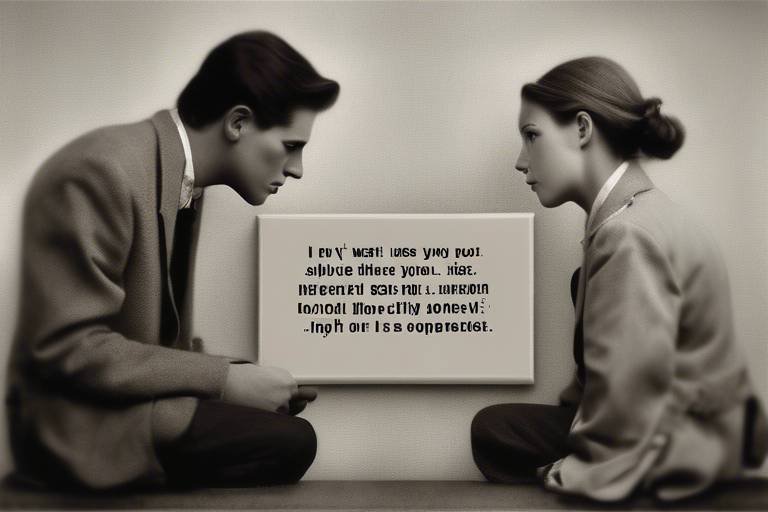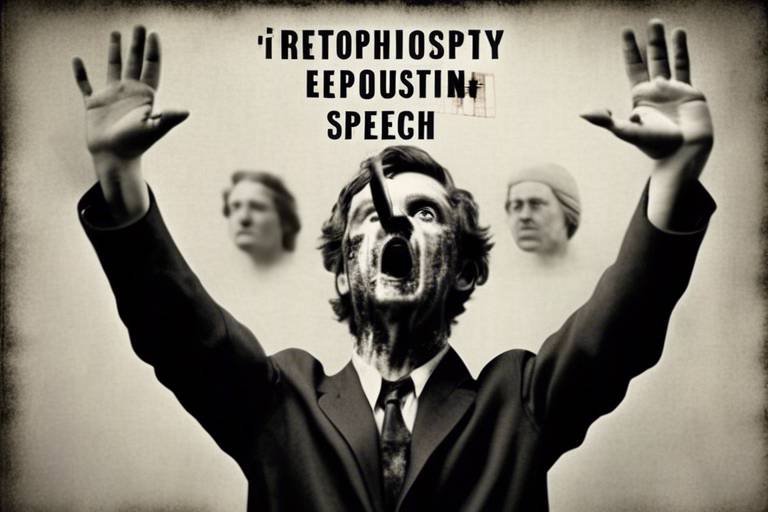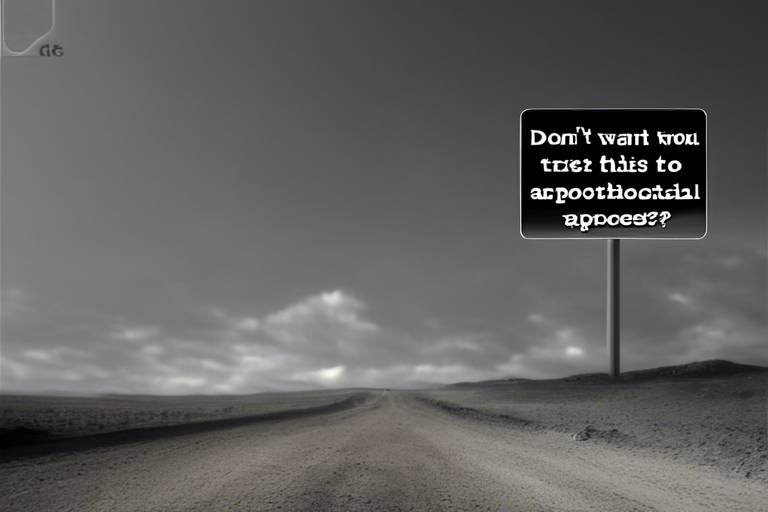Exploring Hannah Arendt's Philosophy of Power
Hannah Arendt, a profound thinker of the 20th century, invites us to dive deep into the complexities of power. Her philosophy challenges us to rethink our understanding of authority, violence, and the nature of human relationships. In a world where power often seems synonymous with oppression, Arendt's insights shine a light on the potential for collective strength and shared goals. She argues that power is not merely a tool wielded by the few, but a dynamic force that emerges from our interactions and cooperation within communities. This article aims to unravel her intricate thoughts on power, exploring how they resonate in today’s society.
At the heart of Arendt's philosophy lies the concept of power as a collective phenomenon. She asserts that power is built through relationships and shared aspirations, contrasting it sharply with violence and authority. In her view, power is not something that can be hoarded or possessed; rather, it thrives in the spaces where people come together to pursue common objectives. This perspective invites us to consider the importance of community and collaboration in fostering a vibrant society. Imagine a garden where every plant contributes to the ecosystem; similarly, power flourishes when individuals unite to achieve something greater than themselves.
Arendt famously differentiates between power and violence, suggesting that true power is rooted in cooperation and consensus. Violence, on the other hand, is merely a tool of coercion, often wielded by those who lack genuine authority. This distinction is crucial, especially in today’s world where the line between power and violence can often blur. Arendt’s insights challenge us to reflect on the methods we use to achieve our goals. Are we fostering dialogue and understanding, or are we resorting to force? The implications of her arguments are profound, urging us to seek power through peaceful means rather than through violence.
Authority, according to Arendt, is deeply rooted in tradition and legitimacy. It complements power by providing a framework within which individuals can act together. In her view, authority is not about domination but about the recognition of shared values and norms that bind a community. This understanding of authority is vital for maintaining social order without the need for violence. When authority is respected, it fosters an environment where power can be exercised responsibly, allowing societies to thrive. Arendt’s thoughts prompt us to consider how authority is established and maintained in our own communities.
Exploring the concept of legitimacy, Arendt argues that a government’s power must be grounded in the consent of the governed to be truly effective. This idea raises important questions about our own political systems. Are our leaders acting with legitimacy? Do they have the consent of the people they govern? When authority is perceived as legitimate, citizens are more likely to engage and participate actively in the political process. This engagement is crucial for the health of democracy, as it ensures that power remains in the hands of the people.
Arendt’s reflections on tradition highlight a significant tension between historical continuity and modernity. This tension impacts how authority is perceived and exercised in contemporary politics. In a world that is constantly changing, how do we honor our traditions while embracing new ideas? Arendt suggests that understanding our past is essential for navigating the complexities of modern governance. This balance is critical in maintaining authority and ensuring that power is wielded responsibly.
Arendt's analysis of totalitarianism reveals the dark side of power manipulation. She illustrates how such regimes exploit power dynamics to suppress freedom and control the populace. In her view, totalitarianism is a perversion of power, where the state seeks to dominate every aspect of life, leaving no room for individual agency. This insight serves as a cautionary tale for contemporary societies, reminding us to remain vigilant against the erosion of democratic structures and the rise of authoritarianism.
In her examination of the Holocaust, Arendt introduces the chilling concept of the banality of evil. She suggests that ordinary individuals, when placed within oppressive systems, can commit unimaginable atrocities. This notion compels us to reflect on our own moral responsibilities within societal structures. Are we complicit in systems that perpetuate injustice? Arendt’s ideas challenge us to recognize our roles in either perpetuating or resisting power dynamics that lead to harm.
This brings us to the crucial question of individual responsibility. Arendt emphasizes that we must acknowledge our moral duty to act against oppression. Within oppressive systems, it is easy to become passive observers, but her philosophy urges us to recognize that our actions—or inactions—have consequences. We must ask ourselves: how can we contribute positively to our communities and resist the forces of evil? Arendt’s insights serve as a powerful reminder that each of us holds the potential to influence the world around us.
Arendt's philosophy offers critical lessons for today's political landscape. She emphasizes the importance of civic engagement and active participation in democracy. In an age where apathy can reign supreme, her ideas inspire us to take action, to engage in dialogue, and to participate in our communities. By doing so, we can foster a culture of power that is inclusive and empowering, rather than one that is coercive and divisive. Her thoughts resonate strongly in the context of modern activism, reminding us that change is possible when individuals come together with a shared purpose.
- What is Hannah Arendt's main argument about power?
Arendt argues that power is collective and arises from cooperation and shared goals rather than domination or violence. - How does Arendt differentiate between power and violence?
She posits that true power is based on consensus and cooperation, while violence is a coercive tool used by those lacking genuine authority. - What does Arendt mean by the "banality of evil"?
She suggests that ordinary people can commit horrific acts when they become part of oppressive systems, highlighting the importance of individual moral responsibility. - How can Arendt's ideas inform modern activism?
Her philosophy encourages civic engagement and emphasizes the need for individuals to actively participate in democracy to foster positive change.

The Nature of Power
Hannah Arendt’s philosophy of power is a fascinating exploration of how power operates not as a solitary force but as a collective phenomenon. Unlike traditional views that often equate power with domination, Arendt emphasizes that power is fundamentally about relationships and shared goals among individuals within a community. Think of power as a vibrant tapestry woven from the threads of collaboration and mutual understanding. When people come together, united by common interests or objectives, they create a dynamic force that is much greater than the sum of its parts.
In Arendt’s view, power is not something that can be hoarded or controlled by a single individual or group; rather, it emerges from collective action. This perspective challenges us to rethink our assumptions about leadership and authority. Instead of viewing leaders as the sole bearers of power, we should recognize that power is generated through the engagement and participation of every member of a community. This realization can be both empowering and daunting, as it places the responsibility for fostering power squarely on our shoulders.
Moreover, Arendt makes a compelling distinction between power and violence. While power is built through cooperation, violence represents a breakdown of that cooperation. When communities lose their ability to collaborate, they often resort to violence as a means of imposing control. This stark contrast raises critical questions about the nature of authority and governance. Are we fostering environments where power can flourish through dialogue and consensus, or are we allowing fear and coercion to dictate our interactions?
To further illustrate Arendt's ideas, consider the following table that highlights the key differences between power and violence:
| Aspect | Power | Violence |
|---|---|---|
| Nature | Collective | Coercive |
| Source | Cooperation | Fear |
| Outcome | Consensus | Domination |
| Longevity | Durable | Temporary |
Understanding this distinction is crucial, especially in today’s political landscape where the lines between power and violence can often blur. Arendt's insights compel us to reflect on how we engage with one another and the systems we inhabit. Are we nurturing the seeds of power through our interactions, or are we allowing fear and violence to overshadow our collective potential?
Ultimately, Arendt’s exploration of the nature of power invites us to embrace a more nuanced understanding of how we can collaborate to create meaningful change. It challenges us to recognize the inherent power within our communities and encourages us to act in ways that enhance, rather than diminish, that power. By fostering relationships based on trust, respect, and shared goals, we can cultivate a society where power is a source of empowerment for all.

Power vs. Violence
When we think about power, it's easy to conflate it with violence, especially in a world where headlines scream of conflict and oppression. However, Hannah Arendt offers a profound distinction that reshapes our understanding. She argues that true power is not born from coercion or fear but rather from cooperation and consensus. Imagine a community coming together to achieve a common goal; that collective spirit is where power truly resides. It’s like a symphony where every instrument plays in harmony, creating something beautiful and impactful.
In stark contrast, violence is a tool—a blunt instrument wielded by those who lack genuine power. Arendt emphasizes that violence can destroy but never create. It can impose order temporarily, but it does so at the cost of freedom and trust. Consider a bully in a schoolyard: they may exert control through intimidation, but their reign is built on fear, not respect. This distinction is crucial because it underlines the fragility of power derived from violence. Without the support and willingness of the people, such power is inherently unstable and often leads to a cycle of resistance and further oppression.
Arendt’s insights are especially relevant in today's society. We often witness governments or organizations resorting to violence to maintain control, mistaking it for power. But as history teaches us, this approach is doomed to fail. The Arab Spring, for instance, illustrated how people united against authoritarian regimes, showcasing the strength of collective power over oppressive violence. The uprising was not merely an act of rebellion but a profound assertion of power grounded in shared values and aspirations.
To further illustrate this point, consider the following table that summarizes the key differences between power and violence:
| Aspect | Power | Violence |
|---|---|---|
| Nature | Collective and constructive | Individual and destructive |
| Source | Consensus and cooperation | Coercion and fear |
| Outcome | Creation and stability | Destruction and chaos |
| Longevity | Enduring and evolving | Temporary and volatile |
Ultimately, Arendt's philosophy challenges us to rethink how we engage with power in our lives. Are we passively accepting the violence that surrounds us, or are we actively participating in the creation of a more just society? This question is not merely philosophical; it has real-world implications for how we organize, protest, and advocate for change. By recognizing the difference between power and violence, we can better equip ourselves to foster environments where true power can flourish.
- What is the main difference between power and violence according to Hannah Arendt?
Arendt asserts that power is built on cooperation and collective action, while violence is a coercive tool that lacks the legitimacy and support of the people. - How does Arendt's philosophy apply to modern society?
Her insights encourage individuals to engage in civic activities and resist oppressive systems, emphasizing the importance of collective power in achieving social change. - Can violence ever lead to genuine power?
No, Arendt argues that violence may impose order temporarily but can never create lasting power or legitimacy.

The Role of Authority
Authority, in the lens of Hannah Arendt, is a fascinating concept that intertwines deeply with the notions of power and legitimacy. Arendt argues that authority is not merely about control or dominance; rather, it is rooted in tradition and legitimacy. This means that authority derives its strength from the historical context and the shared beliefs of a community. It’s like the foundation of a house—without a solid base, the structure cannot stand firm. In this sense, authority is essential for maintaining social order, as it provides a framework within which individuals can coexist and cooperate.
What makes authority particularly intriguing is its ability to operate without the overt use of force. Arendt believed that true authority is recognized and respected by the people, rather than imposed upon them. This recognition creates a bond between those in power and the governed, fostering a sense of belonging and commitment to shared goals. Imagine a captain steering a ship; if the crew trusts their captain’s judgment, they will willingly follow, even through turbulent waters. This is the essence of authority—it is about creating a shared vision that people are eager to support.
However, the relationship between authority and power is not without its complexities. While authority can enhance social cohesion, it can also become problematic if it is rooted in outdated traditions or if it fails to adapt to changing societal values. In such cases, authority risks becoming a tool of oppression rather than a means of fostering community. Arendt’s insights encourage us to critically examine the sources of authority in our lives and to question whether they truly serve the collective good or merely uphold the status quo.
Furthermore, Arendt emphasizes that authority must be complemented by the active participation of the governed. This means that for authority to be legitimate, it must be grounded in the consent of the governed. When individuals feel empowered to voice their opinions and contribute to decision-making processes, authority transforms from a top-down imposition into a collaborative effort. This dynamic is crucial for the health of any democracy, as it ensures that power is not concentrated in the hands of a few, but rather shared among many.
In summary, Arendt’s exploration of authority reveals its dual role in society. On one hand, it can be a force for good, enabling cooperation and social order. On the other hand, if misused or unexamined, it can lead to oppression and stagnation. As we navigate the complexities of modern governance, it is imperative to reflect on the nature of authority and its impact on our lives. Are we simply accepting authority as it is presented to us, or are we actively engaging with it to shape a better future?
- What is the difference between authority and power?
Authority is rooted in legitimacy and tradition, while power is the ability to influence or control others, often through coercion. - How does Arendt define legitimacy?
Legitimacy, according to Arendt, arises from the consent of the governed, meaning that a government must have the support of its citizens to be deemed legitimate. - Why is authority important in a democratic society?
Authority helps maintain social order and fosters cooperation among citizens, but it must be balanced with active participation from the governed to prevent oppression.

Legitimacy in Governance
When we talk about legitimacy in governance, we are diving into the very essence of what makes a government not just functional, but also respected and accepted by its people. Hannah Arendt emphasizes that for a government to wield true power, it must be grounded in the consent of the governed. This idea isn't just theoretical; it has profound implications for how we view authority and governance in our modern world.
Arendt argues that legitimacy is not merely about having the right to rule; it’s about the trust and agreement of the people. Imagine a ship at sea. The captain may have the authority to steer the vessel, but if the crew doesn’t trust the captain’s judgment, chaos can ensue. Similarly, a government might have the power to enforce laws, but without legitimacy, that power is fragile and can easily crumble under pressure.
Moreover, legitimacy is intricately tied to the concept of accountability. A government that operates transparently and is held accountable for its actions fosters a sense of legitimacy. When citizens feel that their voices matter and that they can influence decisions, they are more likely to support the governing body. This creates a cycle of trust and cooperation, essential for a healthy democracy.
To illustrate this point, let's consider the following elements that contribute to legitimacy:
- Transparency: Open communication about government actions and decisions.
- Participation: Encouraging citizen involvement in the political process.
- Justice: Ensuring that laws are applied fairly and equitably.
- Respect for Rights: Upholding individual freedoms and human rights.
These elements not only enhance the legitimacy of a government but also strengthen the bond between the state and its citizens. When people perceive their government as legitimate, they are more likely to engage in civic activities, vote, and support policies that align with their values.
In contrast, when a government lacks legitimacy, it often resorts to coercive measures to maintain control. This can lead to widespread discontent, protests, and even revolutions. Arendt’s insights remind us that power derived from coercion is inherently unstable and can lead to a breakdown in social order. Thus, the quest for legitimacy is not just a philosophical exercise; it's a crucial component of effective governance.
In conclusion, Arendt's perspective on legitimacy in governance challenges us to reflect on the nature of authority and power in our own societies. Are our governments truly legitimate in the eyes of the people? Do they foster trust and accountability? As we navigate the complexities of modern governance, these questions remain vital for ensuring that power is exercised justly and effectively.
- What is legitimacy in governance? Legitimacy in governance refers to the acceptance and recognition of a government's authority by its citizens, grounded in their consent and trust.
- Why is legitimacy important? Legitimacy is crucial because it fosters stability, trust, and cooperation between the government and its citizens, enabling effective governance.
- How can a government maintain its legitimacy? A government can maintain legitimacy by being transparent, accountable, and responsive to the needs and rights of its citizens.

Tradition and Modernity
Hannah Arendt's reflections on tradition and modernity reveal a fascinating tension that continues to shape our understanding of power and authority. She believed that tradition serves as a bridge connecting the past with the present, offering a sense of continuity that can ground communities in shared values and beliefs. However, as modernity pushes forward with rapid change and innovation, it often challenges these established norms, leading to a dynamic interplay between respect for historical legacies and the need to adapt to contemporary realities.
Arendt argued that this tension is not merely theoretical; it has real-world implications for how societies function. In her view, the erosion of tradition can lead to a sense of alienation among individuals, as they may feel disconnected from the values that once provided a framework for their lives. Conversely, an overreliance on tradition can stifle progress and hinder the ability of societies to evolve. This duality highlights the necessity of finding a balance between honoring the past and embracing the future.
To illustrate this point, consider the following aspects of tradition and modernity:
- Continuity vs. Change: Tradition offers stability, while modernity demands adaptation. Arendt posited that societies thrive when they can integrate the wisdom of the past with the innovations of the present.
- Authority vs. Autonomy: Traditional authority often derives its legitimacy from historical precedents, whereas modernity encourages individual autonomy and critical thinking. This shift can lead to conflicts in how power is perceived and exercised.
- Community vs. Individualism: Traditions often foster a sense of community and belonging, while modernity can promote individualism and self-interest. Arendt believed that a healthy society must navigate these competing influences.
In contemporary politics, the challenge lies in recognizing how these forces shape our understanding of power. For instance, as we witness the rise of populist movements that often draw on traditional values, we must also consider how these movements interact with modern democratic principles. Arendt's insights prompt us to reflect on whether such movements genuinely represent the will of the people or whether they risk undermining the very democratic structures they claim to uphold.
Ultimately, Arendt's exploration of tradition and modernity serves as a reminder that power is not static; it is constantly evolving. By engaging with both our historical roots and the demands of modern life, we can develop a more nuanced understanding of authority and its implications for our collective future.
- What is the significance of tradition in Arendt's philosophy?
Tradition provides a sense of continuity and legitimacy, grounding communities in shared values that can influence authority and power dynamics. - How does modernity challenge traditional values?
Modernity often promotes change and individualism, which can lead to conflicts with established traditions and norms, creating a dynamic tension in society. - Can tradition and modernity coexist?
Yes, Arendt believed that a balance between honoring tradition and embracing modernity is essential for healthy societal development.

Power in Totalitarian Regimes
Hannah Arendt's analysis of power in totalitarian regimes is both profound and unsettling. She argues that these regimes do not merely exert power; they manipulate it in ways that fundamentally alter the relationship between individuals and the state. In her view, totalitarianism represents a radical departure from traditional forms of governance, where power is often derived from consensus and community engagement. Instead, totalitarian regimes rely on a combination of fear, propaganda, and the systematic suppression of dissent to maintain their grip on power.
One of the key mechanisms that Arendt identifies is the use of ideology as a tool for control. Totalitarian regimes create a comprehensive worldview that permeates all aspects of life, effectively reshaping reality to fit their narrative. This ideological framework serves several purposes:
- Justification of Actions: It provides a rationale for the regime's policies, no matter how brutal.
- Unifying Force: It seeks to unify the populace under a single belief system, erasing individual differences.
- Dehumanization: It often involves the dehumanization of perceived enemies, making it easier to justify violence against them.
Arendt emphasizes that the totalitarian state does not just seek to control actions; it aims to dominate thoughts and beliefs. This is a critical distinction because it indicates a level of oppression that goes beyond mere political suppression. Individuals are not only coerced into compliance but are also compelled to internalize the regime's ideology. This leads to what Arendt famously termed the "banality of evil," where ordinary people become agents of horrific acts, often without a full understanding of the moral implications of their actions.
Moreover, totalitarian regimes employ a range of tactics to ensure their power remains unchallenged. These include:
- Surveillance: Constant monitoring of citizens to instill fear and deter dissent.
- Propaganda: State-controlled media that disseminates information aligned with the regime's interests.
- Suppression of Opposition: Elimination of political rivals and any form of resistance through imprisonment or violence.
Arendt's insights into totalitarianism serve as a cautionary tale for contemporary society. Her work encourages us to remain vigilant against the erosion of democratic values and the rise of authoritarianism. In a world where the lines between truth and propaganda can become blurred, understanding the mechanisms of power as described by Arendt is more crucial than ever. We must recognize that power, when unchecked, can lead to the most profound injustices, and it is our responsibility as citizens to actively engage in safeguarding our freedoms.
What is the main argument of Hannah Arendt regarding power in totalitarian regimes?
Arendt argues that totalitarian regimes manipulate power through fear, propaganda, and ideological control, fundamentally altering the relationship between individuals and the state.
How does Arendt differentiate between power and violence?
Arendt views power as arising from collective action and cooperation, while violence is seen as a coercive tool that undermines true power.
What role does ideology play in totalitarian regimes according to Arendt?
Ideology serves as a unifying force that justifies the regime's actions, dehumanizes enemies, and reshapes reality to fit the state’s narrative.
Why is Arendt's concept of the "banality of evil" significant?
This concept highlights how ordinary individuals can commit atrocities under totalitarian regimes, often without fully grasping the moral implications of their actions.

The Banality of Evil
Hannah Arendt's exploration of the concept of emerged from her observations during the trial of Adolf Eichmann, a key figure in the Holocaust. Rather than portraying Eichmann as a monstrous villain, Arendt described him as an ordinary bureaucrat, more concerned with his job and following orders than with the moral implications of his actions. This startling revelation forces us to reconsider our understanding of evil. It suggests that atrocities can be committed by individuals who are not inherently evil but are instead caught up in a system that normalizes horrific actions.
Arendt's idea challenges the notion that evil is always the product of malevolence. Instead, she posits that it can arise from a failure to think critically about one’s actions and their consequences. This notion is particularly unsettling, as it implies that anyone could become complicit in wrongdoing simply by adhering to societal norms or obeying authority without question. In essence, the banality of evil serves as a warning: it reminds us that indifference and conformity can lead to moral blindness.
To illustrate this point, consider the following scenarios where individuals might overlook their moral responsibilities:
- A corporate employee who ignores unethical practices in their company because "everyone else is doing it."
- A government worker who enforces unjust laws, believing they are just doing their job.
- A citizen who remains apathetic to political corruption, thinking their vote doesn't matter.
These examples highlight how ordinary people can become enablers of evil through their inaction or failure to question authority. Arendt's insights compel us to reflect on our own roles within society. Are we mere spectators, or do we actively engage in the moral discourse that shapes our communities? The banality of evil encourages us to take a stand against injustice, reminding us that moral responsibility lies within each of us.
Moreover, Arendt’s reflections on the Holocaust prompt us to consider the implications of her philosophy in contemporary society. As we witness the rise of authoritarianism and the erosion of democratic values worldwide, her ideas resonate more than ever. We are reminded that the capacity for evil exists within all of us, particularly when we fail to challenge oppressive systems or disengage from civic life. Thus, the banality of evil is not just a historical concept; it serves as a critical lens through which we can examine our own actions and the societal structures we inhabit.
In conclusion, Arendt’s concept of the banality of evil serves as a powerful reminder of the dangers of complacency and the importance of individual moral responsibility. By recognizing that evil can manifest in mundane forms, we are better equipped to resist it and foster a society grounded in justice and empathy. As we navigate the complexities of modern life, let us strive to be vigilant, questioning authority and actively participating in the moral fabric of our communities.
- What is the banality of evil? The banality of evil is a concept introduced by Hannah Arendt that suggests ordinary people can commit atrocious acts simply by conforming to societal norms and obeying authority.
- How does Arendt's idea apply to modern society? Arendt's insights encourage individuals to engage in moral reflection and civic responsibility, emphasizing that inaction or conformity can lead to complicity in evil.
- Can anyone become complicit in evil actions? Yes, Arendt argues that through indifference and failure to think critically, ordinary individuals can become enablers of evil.

banality of evil,
Arendt's perspective on power emphasizes its collective nature, distinguishing it from violence and authority. This section explores how power is built through relationships and shared goals within communities.
Arendt famously differentiates between power and violence, arguing that true power arises from cooperation and consensus, while violence is a tool of coercion. This section analyzes her arguments and their relevance today.
Authority, according to Arendt, is rooted in tradition and legitimacy. This subheading examines how authority complements power and its role in maintaining social order without resorting to violence.
Exploring the concept of legitimacy, this section discusses how Arendt believes that a government’s power must be grounded in the consent of the governed to be truly effective.
Arendt’s thoughts on tradition highlight the tension between historical continuity and modernity. This part discusses how this tension impacts authority and power dynamics in contemporary politics.
Arendt's analysis of totalitarianism reveals how such regimes manipulate power and suppress freedom. This section investigates her insights into the mechanisms that undermine democratic structures.
In her examination of the Holocaust, Arendt introduces the concept of the banality of evil, suggesting that ordinary individuals can commit atrocities without any malicious intent. This provocative idea challenges our understanding of morality, as it implies that evil acts can stem from a lack of critical thinking and unquestioning obedience to authority. Arendt illustrates this with the case of Adolf Eichmann, a Nazi official who orchestrated the logistics of the Holocaust. During his trial, Eichmann appeared not as a monster but as a bureaucrat who was simply doing his job, highlighting that evil can manifest in mundane ways.
Arendt's notion of the banality of evil serves as a cautionary tale, urging us to reflect on our own roles within societal structures. It raises unsettling questions: Are we complicit in systems that perpetuate injustice? How often do we follow orders without questioning their morality? The implications of her theory extend beyond historical events, encouraging us to maintain a vigilant and critical stance in our everyday lives. For example, in contemporary society, we must consider how our actions—or inactions—contribute to larger systemic issues, such as inequality or environmental degradation.
Furthermore, Arendt’s insights compel us to confront the uncomfortable reality that individuals can become agents of evil not through hatred, but through a failure to think critically. This raises an essential point about individual responsibility in oppressive systems. It challenges us to recognize that the capacity for evil exists within all of us, and that it is our duty to resist complacency and engage actively in the moral fabric of our communities. Ultimately, Arendt’s philosophy invites us to cultivate a sense of moral awareness and responsibility, ensuring that we do not become unwitting participants in the machinery of oppression.
This subheading addresses the moral responsibility of individuals within oppressive systems, exploring how Arendt’s ideas challenge us to recognize our roles in perpetuating or resisting power structures.
Arendt's philosophy offers critical lessons for today's political landscape, emphasizing the importance of civic engagement and active participation in democracy. This section discusses how her ideas can inform modern activism.
- What is the banality of evil? The banality of evil is a concept introduced by Hannah Arendt, suggesting that ordinary people can commit heinous acts simply by conforming to authority and failing to think critically about their actions.
- How does Arendt's philosophy apply today? Arendt's ideas encourage individuals to engage actively in their communities and question authority, highlighting the importance of moral responsibility in preventing systemic injustices.
- What role does individual responsibility play in Arendt's philosophy? Individual responsibility is central to Arendt's thought, as she emphasizes that each person must recognize their potential complicity in oppressive systems and strive to resist them.

suggesting that ordinary individuals can commit atrocities. This section reflects on the implications for understanding power and morality.
Arendt's perspective on power emphasizes its collective nature, distinguishing it from violence and authority. This section explores how power is built through relationships and shared goals within communities.
Arendt famously differentiates between power and violence, arguing that true power arises from cooperation and consensus, while violence is a tool of coercion. This section analyzes her arguments and their relevance today.
Authority, according to Arendt, is rooted in tradition and legitimacy. This subheading examines how authority complements power and its role in maintaining social order without resorting to violence.
Exploring the concept of legitimacy, this section discusses how Arendt believes that a government’s power must be grounded in the consent of the governed to be truly effective.
Arendt’s thoughts on tradition highlight the tension between historical continuity and modernity. This part discusses how this tension impacts authority and power dynamics in contemporary politics.
Arendt's analysis of totalitarianism reveals how such regimes manipulate power and suppress freedom. This section investigates her insights into the mechanisms that undermine democratic structures.
In her examination of the Holocaust, Arendt introduces the concept of the banality of evil, suggesting that ordinary individuals can commit atrocities. This section reflects on the implications for understanding power and morality.
This subheading addresses the moral responsibility of individuals within oppressive systems, exploring how Arendt’s ideas challenge us to recognize our roles in perpetuating or resisting power structures.
Arendt's philosophy offers critical lessons for today's political landscape, emphasizing the importance of civic engagement and active participation in democracy. This section discusses how her ideas can inform modern activism.
Arendt's notion of the banality of evil is a startling reminder that atrocities can be committed by seemingly ordinary people. This idea challenges the common perception that evil is always monstrous and overtly malevolent. Instead, she suggests that individuals can become complicit in horrific acts through a failure to think critically about their actions and the systems in which they operate. It's a chilling thought, isn't it? How many times have we seen individuals, caught in the machinery of bureaucracy, perform actions that contribute to injustice without questioning their role?
Consider this: when people are submerged in a powerful system, they might lose their sense of individual agency. They operate under the assumption that they are merely following orders or adhering to societal norms. This is where the danger lies. The implications for understanding power and morality are profound:
- Normalization of Atrocities: Ordinary people can normalize heinous actions, thinking they are part of their duty or responsibility.
- Critical Thinking: Arendt urges us to engage in critical thinking and moral reflection to avoid complicity in evil.
- Collective Responsibility: We must recognize our collective responsibility to challenge systems that perpetuate injustice.
In a world where power dynamics often lead to moral ambiguity, Arendt's insights compel us to question the status quo. Are we simply cogs in a machine, or do we have the power to resist and reshape our realities? This reflection is essential, as it leads to a deeper understanding of how power operates and the moral obligations we hold as individuals within society.
- What is the banality of evil? The banality of evil is a concept introduced by Hannah Arendt, suggesting that ordinary people can commit heinous acts simply by conforming to the norms of their environment.
- How does Arendt differentiate between power and violence? Arendt argues that power is rooted in collective action and consensus, while violence is a coercive tool that undermines true power.
- What implications does Arendt's philosophy have for modern society? Her ideas stress the importance of civic engagement and individual responsibility in resisting oppressive power structures.

Individual Responsibility
When we dive into the depths of Hannah Arendt's philosophy, one of the most striking themes that emerges is the concept of . Arendt challenges us to reflect on our roles within oppressive systems, urging us to recognize that our actions—or inactions—carry weight. This notion is not just theoretical; it has profound implications for how we navigate our lives within society. Imagine standing in a crowded room where everyone is whispering, and you have the choice to either join the conversation or remain silent. Your silence can be as powerful as your voice, especially when it comes to moral choices.
Arendt's perspective compels us to confront uncomfortable truths about complicity. She argues that individuals often become enablers of tyranny by simply going along with the status quo. This brings to mind the concept of the "bystander effect," where people are less likely to intervene in an emergency when others are present. In the context of power and authority, this phenomenon highlights how collective inaction can perpetuate injustice. To illustrate this, consider the following:
| Action | Consequence |
|---|---|
| Speaking out against injustice | Encourages others to join the fight |
| Remaining silent | Normalizes oppressive behavior |
| Participating in civic engagement | Strengthens democracy |
| Ignoring political issues | Allows tyranny to flourish |
In essence, Arendt's philosophy serves as a clarion call for each of us to take responsibility for our actions. It raises pivotal questions: Are we merely passive observers in the theater of life, or do we actively engage in shaping the narrative? To illustrate the weight of individual responsibility, we can think of historical examples where ordinary individuals made extraordinary choices. Whether it was whistleblowers exposing corruption or activists fighting for civil rights, these individuals remind us that every action counts.
Moreover, Arendt's insights push us to consider the moral implications of our choices. In a world filled with complex social dynamics, understanding our individual responsibility becomes crucial. It’s not just about resisting oppressive regimes; it's about fostering a culture of accountability and ethical behavior in our daily lives. Each of us has the power to influence the world around us, and this influence can either uplift or undermine the very fabric of our society.
As we reflect on the lessons from Arendt’s work, it’s vital to ask ourselves: What legacy do we want to leave? By acknowledging our individual responsibility, we can strive to contribute to a more just and equitable world. The challenge lies in moving beyond mere acknowledgment to active participation. After all, the fight for justice begins with the choices we make every day.
- What does Arendt mean by individual responsibility?
Arendt emphasizes that individuals must recognize their role in perpetuating or resisting power structures, highlighting the moral weight of their choices. - How can we apply Arendt's ideas to modern activism?
By actively participating in civic engagement and holding ourselves accountable, we can make meaningful contributions to democracy and social justice. - Why is silence considered complicity in Arendt's philosophy?
Silence can enable oppressive systems to thrive, as inaction can be interpreted as acceptance of the status quo.

Lessons for Contemporary Society
Hannah Arendt's philosophy offers a treasure trove of insights that resonate deeply with the challenges we face in today's political landscape. Her emphasis on the importance of civic engagement and active participation in democracy serves as a clarion call for individuals who feel disillusioned or powerless in the face of systemic issues. In a world where apathy often reigns, Arendt reminds us that power is not merely something wielded by a select few; rather, it is a collective force that thrives on participation and shared responsibility.
One of the most striking lessons from Arendt is the idea that individuals have the power to shape their communities. This isn’t just about voting every few years; it’s about being actively involved in the processes that govern our lives. Whether it’s attending town hall meetings, engaging in community service, or even participating in protests, every action counts. Arendt challenges us to ask ourselves: Are we merely bystanders in our own lives, or are we willing to step up and take action?
Moreover, Arendt's insights into the nature of authority and legitimacy hold significant relevance today. In her view, a government’s power must be grounded in the consent of the governed. This principle invites us to critically evaluate the legitimacy of our leaders and the systems in place. Are they truly representing our interests, or are they serving their own agendas? By fostering a culture of accountability, we can ensure that our leaders remain attuned to the needs of the people.
In addition, Arendt's reflections on the dangers of totalitarianism remind us to remain vigilant against the erosion of democratic structures. As we witness the rise of populism and authoritarian tendencies in various parts of the world, her warnings serve as a stark reminder of the fragility of freedom. The mechanisms of oppression can be subtle, often masquerading as national security or public order. It is our responsibility to question these narratives and to advocate for transparency and justice.
Another crucial aspect of Arendt's philosophy is the concept of moral responsibility. In her examination of the Holocaust, she introduced the notion of the banality of evil, suggesting that ordinary individuals can commit horrific acts when they fail to recognize their moral agency within oppressive systems. This challenges us to reflect on our own roles in perpetuating or resisting power dynamics. Are we, too, contributing to systems of injustice through our silence or inaction?
Ultimately, Arendt's ideas encourage us to cultivate a sense of agency and responsibility in our communities. By actively engaging in dialogue and fostering relationships based on mutual respect and understanding, we can create a more just and equitable society. This is not merely a philosophical exercise; it is a call to action for all of us. As we navigate the complexities of modern life, let us remember Arendt’s wisdom and strive to be the change we wish to see.
- What is the main idea of Hannah Arendt's philosophy of power?
Arendt emphasizes that power is collective and arises from cooperation and shared goals, distinguishing it from violence and authority. - How does Arendt differentiate between power and violence?
She argues that true power is built through consensus and cooperation, while violence is merely a tool of coercion. - What lessons can we learn from Arendt's analysis of totalitarianism?
Her insights remind us to remain vigilant against the erosion of democratic structures and to question the legitimacy of our leaders. - How can we apply Arendt's philosophy in our daily lives?
By actively participating in our communities, holding our leaders accountable, and recognizing our moral responsibilities, we can foster a more just society.
Frequently Asked Questions
- What is Hannah Arendt's view on the nature of power?
Hannah Arendt believes that power is fundamentally a collective phenomenon. It emerges from relationships and shared goals within communities, rather than being an individual attribute. This perspective emphasizes that true power is built through cooperation and consensus among people.
- How does Arendt differentiate between power and violence?
Arendt famously distinguishes power from violence by asserting that true power arises from collective agreement and cooperation, while violence is merely a tool of coercion used to impose will. This distinction highlights the importance of dialogue and consensus in establishing genuine authority.
- What role does authority play in Arendt's philosophy?
According to Arendt, authority is rooted in tradition and legitimacy, serving to complement power. It helps maintain social order without resorting to violence, relying on the respect and recognition of the governed. This relationship between authority and power is crucial for understanding the stability of societies.
- Why is legitimacy important in governance?
Legitimacy is central to Arendt's idea of effective governance. She argues that a government's power must be grounded in the consent of the governed to be truly effective. Without this foundation, authority risks becoming arbitrary and can lead to unrest or rebellion.
- How does Arendt view the tension between tradition and modernity?
Arendt highlights the tension between historical continuity and modernity, suggesting that this conflict impacts authority and power dynamics in contemporary politics. She believes that understanding this tension is essential for navigating modern governance and societal structures.
- What insights does Arendt provide about totalitarian regimes?
In her analysis of totalitarianism, Arendt reveals how such regimes manipulate power and suppress individual freedoms. She investigates the mechanisms that undermine democratic structures, emphasizing the dangers of unchecked power and the importance of vigilance in maintaining democracy.
- What does Arendt mean by the "banality of evil"?
The "banality of evil" is a concept introduced by Arendt during her examination of the Holocaust. It suggests that ordinary individuals can commit horrific acts when they conform to oppressive systems. This idea challenges us to reflect on our moral responsibility within such structures.
- How does Arendt address individual responsibility in oppressive systems?
Arendt emphasizes that individuals have a moral responsibility to recognize their roles within oppressive systems. Her ideas challenge us to reflect on how we can either perpetuate or resist power dynamics, urging active engagement in the fight against injustice.
- What lessons does Arendt's philosophy offer for contemporary society?
Arendt's philosophy provides critical lessons for today's political landscape, stressing the importance of civic engagement and active participation in democracy. Her ideas encourage modern activism and remind us that each individual has a role to play in shaping a just society.


















